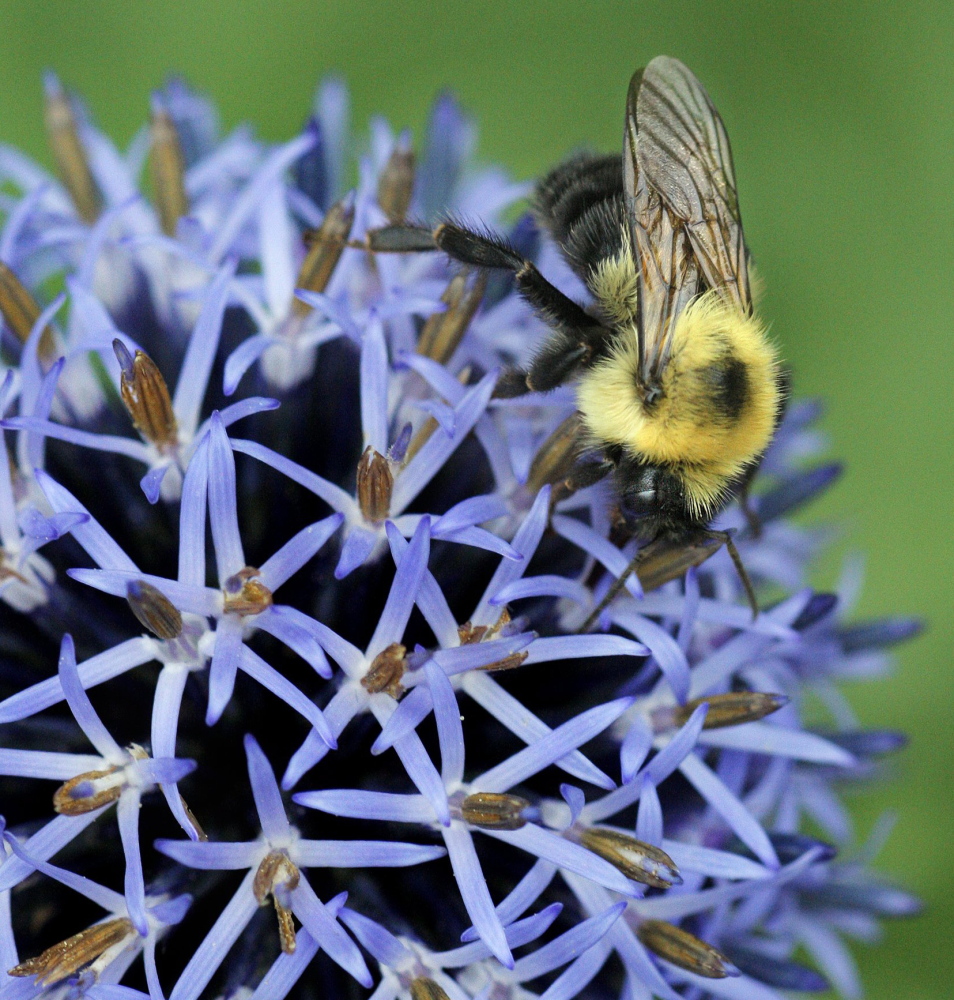Legislators will consider a bill in the coming session to place a moratorium on neonicotinoid pesticides, which some studies have shown to be harmful to honeybees.
“The Legislative Council approved it for consideration in the short session,” said Rep. Brian Jones, D-Freedom, the bill’s sponsor. “They perceive that it may be an emergency, and I was kind of pleased by that.”
Honeybees, as well as other bees such as bumblebees, are necessary in agriculture because they pollinate crops, which is necessary for the production of most fruits and vegetables.
Neonicotinoids are a broad class of systemic pesticides, meaning that the chemicals are absorbed into the tissue of plants to kill insects harmful to them. But some studies have shown that neonicotinoids also kill or cause paralysis in many types of bees, and other studies have found that neonicotinoids cause bees to become disoriented, so they can’t find their hives.
The studies also have shown that neonicotinoids show up in wax and nectar found in beehives.
However, some studies have shown that neonicotinoids are not harmful to bees at all.
Jones, a licensed beekeeper with six hives, said he is going to propose a two-year moratorium on the use of the pesticides while further research is done.
“The reason I started to explore this is that the European Union created a two-year moratorium last July, because a couple of studies” showed that the pesticides damaged bees, Jones said, and were a possible contributing factor in colony collapse disorder.
Frank Drummond, a University of Maine professor with specialties in blueberry pollination and integrated pest management, said the jury is still out on whether neonicotinoids harm bees.
“Because of that very controversial and contradictory data, a moratorium would not be a bad thing, especially since for a lot of the agricultural industry there are alternatives,” Drummond said.
He said he would recommend that money be included to pay for the study of the pesticides’ effects on pollinators.
Drummond added that neonicotinoids are a broad range of herbicides, and that some have been shown to be more harmful than others.
Lois Berg Stack, an ornamental horticulture specialist and professor at the University of Maine Extension, said use of the pesticides is very common.
“They are used for a wide variety of pests, both by commercial growers and by the homeowner,” Stack said.
She said the pesticides can be used on seeds by people who sprout them to create small plants, and on plants as they’re grown to marketable size by commercial growers, and then by those who retail the plants. Each of those steps could be done in various locations and in different states.
“The whole job of record-keeping, where the crops are started and then grown and at the retailer will be a real challenge,” she said.
And the neonicotinoids last a long time.
“They are very persistent chemicals in the plant and very persistent chemicals in the soil,” she said, “and it would be expensive to test every crop to find out if it had neonicotinoids in it.”
All of that means enforcing a moratorium could be difficult.
Drummond said commercial farmers in Maine do not use many neonicotinoids because of the types of crops grown here. He believes the most common use is in home gardens.
Ever since the lily leaf beetle arrived in Maine, I have been advising readers to use Bayer Advanced Rose and Flower treatment on lilies if they can’t keep up with the beetles by hand-picking. The main active ingredient in that product is imidacloprid, one of the pesticides that would be banned under the moratorium.
Stack said that Friends of the Earth has released a 33-page report called “Gardeners Beware,” which is available at http://tinyurl.com/mfpgqma. The report discusses the science of the effect of neonicotinoids on bees and other pollinators, and recommends that home gardeners buy organic plants grown without neonicotinoids, and that they stop using them in their own gardens.
Tom Atwell has been writing the Maine Gardener column since 2004. He is a freelance writer gardening in Cape Elizabeth and can be contacted at 767-2297 or at:
tomatwell@me.com
Send questions/comments to the editors.



Success. Please wait for the page to reload. If the page does not reload within 5 seconds, please refresh the page.
Enter your email and password to access comments.
Hi, to comment on stories you must . This profile is in addition to your subscription and website login.
Already have a commenting profile? .
Invalid username/password.
Please check your email to confirm and complete your registration.
Only subscribers are eligible to post comments. Please subscribe or login first for digital access. Here’s why.
Use the form below to reset your password. When you've submitted your account email, we will send an email with a reset code.